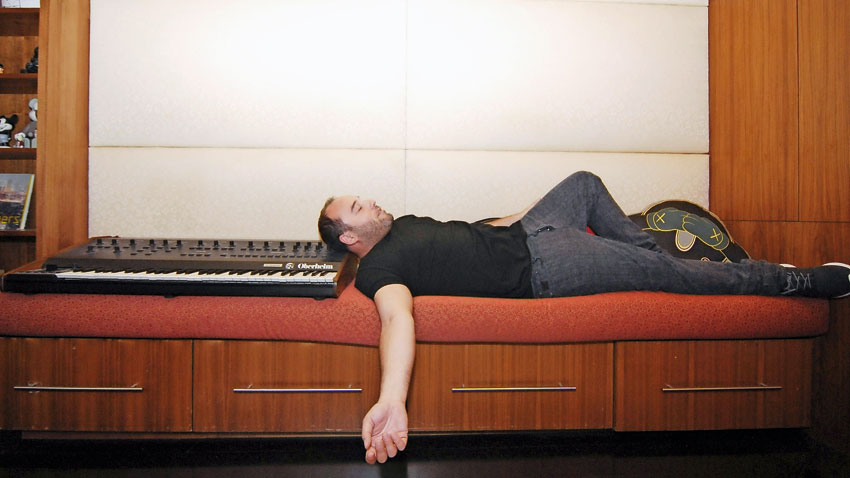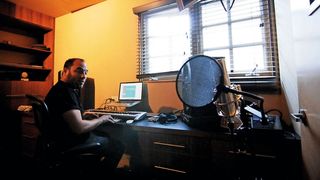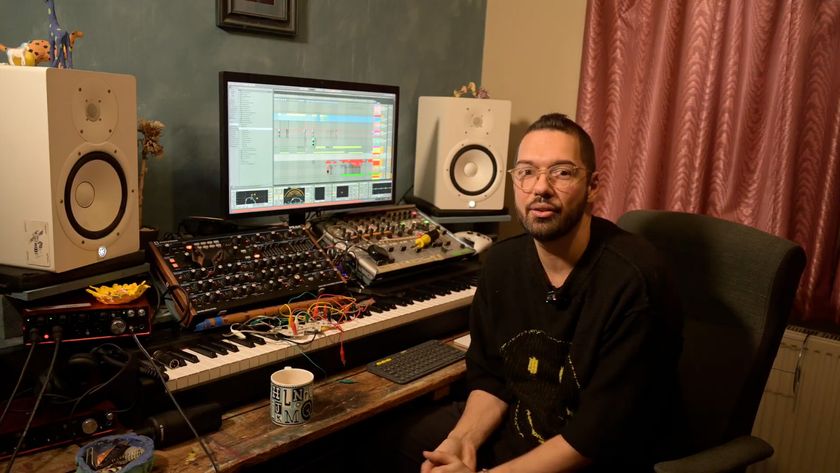Jesse Rose talks DJing, production and juggling far too many record labels
We chat to one of house music's unsung heroes at the dawn of his debut release for Fabriclive…

Having studied production under the mentorship of Jamie Anderson and Switch, Jesse Rose moved back to London in the late 90s to hone his particular blend of Chicago house and Detroit techno. 20 years later, he's one of house music's most prolific producers, with over 100 self-penned productions and just as many remixes.
Rose's idealistic lifestyle usually finds him balanced somewhere between Barcelona and LA, his busy schedule demanding that he works on the fly with minimal gear. Plying his trade at numerous residencies across the globe, the workaholic DJ and label owner has always believed in giving the crowd what they want by letting the music speak for itself.
What are you up to in LA right now - are you still living there?
"I'm living between Barcelona and LA, but mostly Barcelona. I've been in LA for five years but the commute over to Europe every two weeks started to take its toll. I can't complain at constantly following the sun; I had a little taste of the English weather at Christmas to see friends and family, but enjoyed getting straight out."
How does LA's house music scene compare to London's?
"I moved from London to Berlin and lived there for five years, and the contrast between the two was really hefty. Berlin felt like London 20 years before, when it was all super underground; but suddenly Berlin felt like it was doing the same thing over and over. Randomly, LA felt like the same scenario because, in a city so large, you could find all these warehouse parties and there were things going on all the time that were exciting. I think it's rotational."
Presumably you prefer the underground vibe to the more commercial aspects of the scene.
Get the MusicRadar Newsletter
Want all the hottest music and gear news, reviews, deals, features and more, direct to your inbox? Sign up here.
"Yeah, I prefer the concept of clubs underground trying to push things forward and not getting stuck in a rut, which is what pop music is for if you know what I mean. I think our job is to innovate and keep trying to push things forward, so yeah, I feel way more comfortable in environments where people don't want to hear records they know already."

Tell us about your rise to popularity and the artists that helped shape you into the producer you are today…
"In terms of shaping me as a producer, there are two people who directly influenced that. The first was Jamie Anderson, who I met when I moved to Bristol. He was producing amazing Detroit techno, whereas I'd been listening to drum 'n' bass and hip-hop. He really changed my outlook and got me in the studio co-producing and getting involved with gear - everything he worked on was all hardware-based; he had a very techno-inspired setup.
"At that point, I thought of myself as a DJ who could just sit in the back of a studio and put my feelings across, but when I moved to London I bumped into a guy called Dave Taylor (aka Switch). I started making music with him for Derrick Carter's Classic label, and he told me that I really needed to be able to produce or engineer, so I went off and spent a couple of months learning how to use Logic and the rest is history - I'm nearly up to my hundredth Jesse Rose track, maybe 250 including remixes."
Many people credit you with putting a different twist on house music. Was that your objective or just your particular style coming through?
"Really early on, I was just trying to replicate all the Chicago and Detroit house records that I liked, but there was a period when I was working with Switch where some weird samples happened to get inside the records. Eventually, it became a joke to see how far we could push things. We'd put a folk sample in the middle of a record for two minutes and somehow it worked, and people liked it because they weren't hearing the same thing for five minutes.
"Rather weirdly, we started a sub-genre and more people started making that type of music. But at that point it lost the humour and irony, and I felt that I didn't really need to drop weird samples in records any more; I could do other things that maybe weren't so corny."
"I think there's two sides to music. There's a time for experimentation, which I think is super important, otherwise you'd never have any new genres; but on the other side, it's about creating a piece of music that touches you, and that's timeless."
Was that the genre known as fidget house?
"Yeah, I guess that's what they called it [laughs]. To be honest, by the time they'd named it fidget house I'd moved to Berlin and taken a residency at the Panorama Bar, which is probably the most underground Techno mecca in the world; but ever since the very beginning, when I started DJing, it's all just been about my love for house music."
Is it important for a genre to evolve, or does it need to stay at least rooted in whatever made it appealing to people in the first place?
"It's a hard question to answer. I think there's two sides to music. There's a time for experimentation, which I think is super important, otherwise you'd never have any new genres; but on the other side, it's about creating a piece of music that touches you, and that's timeless, so I guess you need a mixture of both. The Mr Fingers track Can You Feel It came out 25 years ago and is still as important now as it was then; but at the same time, James Blake's Air & Lack Thereof came out five years ago, and when I heard that I was like, 'Damn, this is innovation'."
Without overthinking it, do you aim to get that natural balance in your own music, too?
"I would hope to be in the middle of it. I mean, to me, my records definitely don't sound the same and I do feel like they've evolved and changed to hopefully deliver the unexpected - although that's not the best way to sell records. People love McDonald's because they know what they're getting, but the most important thing is that there's feeling in those records. To be honest, I'm not quite sure how I've managed to have a 20-year career, where I DJ all over the world every weekend, remix Rudimental or make Fabric compilations, because I don't really make big hit records. I go in the studio, make what I feel and don't even think about whether it's going to work in a set. I'm not a career producer, and if no one bought those records, I would still be making them."
What's your current DJ setup?
"I'm using three Pioneer 2000s and the 900 mixer - nothing too exciting about that [laughs]. I was still playing vinyl until three or four years ago, but it became more and more difficult because the deck setups weren't that good. I'd set up in a big club, play a record and it would feed back to the whole crowd, and having 9,000 people looking at you feeding back is not really the way forward, is it? It made sense that if I was going to play to lots of people, often, then I needed to move from that setup. I do miss that element of things going wrong with vinyl, because it has quite a nice, organic element to it; but the way I'm mixing now is way beyond the skillset of when I was playing vinyl. I couldn't keep three records in the mix for three minutes - Jeff Mills could, but I wouldn't generally attempt that."
What's most important for a DJ - practising technique or connecting with an audience?
"I definitely play around with what's available using the Pioneer mixer and CDJs, but I also like to have respect for the records I play. I liked the disco way, where classic DJs would play a record from start to finish and not do a lot of mixing, because they believed that the records they were mixing were totally on-point. Your job as a DJ is to connect with the audience emotionally, which is more important than trying to prove you're the best at DJing."
People moan about EDM artists going up on stage and not really doing much. Do you have a view on that?
"Not really, because I can't explain how different that world is from my world. It's almost as far away as you asking me about how a rapper would do their show. The point of an EDM DJ is that they play records to people who want to hear records they already know, played by that person. I'd imagine most EDM DJs aren't even pretending they're not playing a CD or a mix set, but if I went to a club with a pre-recorded set I'd get kicked off the decks so quickly it would be unbelievable [laughs]."
Being so busy, where do you find time to focus on the numerous labels you run - all four of them?
"I'm trying desperately to bring that right down. Hopefully, by the end of this year I'll have it down to one label. It's just that I'm very interested in lots of different styles of music, and sometimes you need lots of different outputs because people do have their own tastes. But for me, none of it feels like work; when you're doing something you really love, it doesn't feel like a chore."
"None of it feels like work; when you're doing something you really love, it doesn't feel like a chore."
What's your favourite residency at the moment and what makes a club special?
"I think the one really simple thing that makes the connection between any place that you play in the world, from the biggest festival to the smallest club or house party, is the crowd. It's the people that go there that make it, and I think their feedback is what it's all about. I've done shows at Womb in Tokyo, Juarez in Mexico, Watergate in Berlin and Fabric in London, and these are all places where people
go because they're into the music, not to just get drunk or high."
Are your productions done on the move or do you wait until you get into a settled space?
"It's pretty messy and changes all the time. My studio in LA is a beautiful soundproofed room with a vocal booth, but the most important thing to me is my Adam monitors. Then I'll hire equipment or friends will bring over different stuff and I'll just sample it. In terms of production, I was brought up having the least amount of stuff and trying to do the most with it.
"For the first five years of having Logic, I didn't use any external VSTs - just what came with it. I'd often say to Switch, why don't you get more gear and try out new things? And his reply was, because we still haven't worked out how all the stuff that comes with Logic works - and he was producing M.I.A., Santigold and other really big acts."
So are people too quick to grab the latest new thing without realising they could squeeze a lot more out of their existing software package?
"I don't think there is a right or wrong way; everyone has to make music the way it works for them. Some people think Ableton sounds terrible, but Henrik Schwarz makes some of the best records ever using Ableton. And some people will laugh at Reason, but Claude VonStroke has made amazing records on Reason. But there is validity in saying that having a limited amount of stuff could be helpful in terms of people getting a really deep knowledge of what they're using."
You must have a preference for certain types of hardware, though, surely?
"A Linn Drum - I just love that machine - and the Roland TR-808 and 909. It depends on what I'm doing on a particular day as to what I think a record could do with. I'll need a 909 if I happen to need a type of kick drum or tom for whatever I'm making; then I'll try and ring someone, go and hire one or see if I can use something that I've already sampled."
You're known for creating quite sample-heavy tracks. Where would you typically head to for sample inspiration?
"I just listen to so much music all the time, and I usually get inspired by everything that's not house music, which could be grime, hip-hop, classical or funk. It's quite easy if you're just listening to music to find samples - they almost come to you. When I was younger, I remember digging for samples in Portobello market, waiting for it to finish, when there would be vinyl everywhere. Now, through building collections of records and music that I've spent years listening to, I'll automatically sample something and put it in a folder to use later."

Are there any soft synths or plugin effects that you're particularly keen on?
"I guess it's changing all the time, but I'm not very nerdy when it comes to technology; it's more about getting my head down, testing things out and making the music. I have people come and load ridiculous amounts of software on my computer. Lately, I've been using CamelPhat multi-effect software and the Waves H-Comp Hybrid Compressor plugin. I really like the Waves OneKnob Series - the Brighter, Louder and Pressure - all three of those are great, and a really simple way to get something out of a sample as quickly as possible.
"To be honest, if a track's going really well then I'm using the least amount of EQ and compression on it. In terms of advice, I'd say that, if the original ingredients are great, you really don't have to do much to it."
If you're using a ton of samples, then your sounds are largely EQ'd already, anyway, right?
"Yeah, exactly [laughs]. On some records, I'll use soft synths, but generally it will be a Dave Smith Prophet or something from the Korg Legacy collection, which is not super great - I'd actually prefer to use the originals, as with the software you do have to spend time EQing stuff because it doesn't sound like the hardware."
What can you tell us about the upcoming mix CD you've done for Fabriclive?
"It's actually a really big bill for me, because I've been playing at Fabric since it opened, which has been a long period of time - 15 years or something. So to be asked to do Fabriclive 85 was a real honour, and there was a lot of pressure to try and put everything that I'm about into a 60-75 minute mix. I hope it delivers a little taste of what I'm about. I decided to mix it live because I was travelling, so ended up mixing it in New Jersey, Sydney and Barcelona, I think!"
Fabriclive 85: Jesse Rose is out now. For the latest news and DJ dates head to his website.


Future Music is the number one magazine for today's producers. Packed with technique and technology we'll help you make great new music. All-access artist interviews, in-depth gear reviews, essential production tutorials and much more. Every marvellous monthly edition features reliable reviews of the latest and greatest hardware and software technology and techniques, unparalleled advice, in-depth interviews, sensational free samples and so much more to improve the experience and outcome of your music-making.

“My love letter to a vanished era that shaped not just my career but my identity”: Mark Ronson’s new memoir lifts the lid on his DJing career in '90s New York

“I'm always starting up sessions and not finishing them, but I don't see that as unproductive”: Virtuosic UK producer Djrum talks creativity and making Frekm Pt.2









